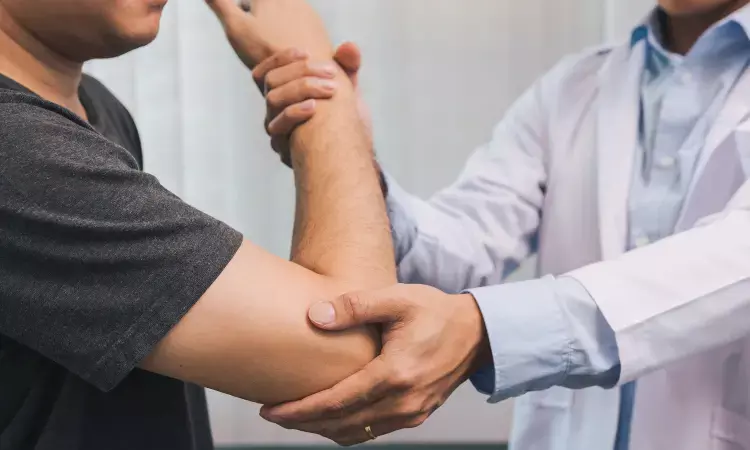- Home
- Medical news & Guidelines
- Anesthesiology
- Cardiology and CTVS
- Critical Care
- Dentistry
- Dermatology
- Diabetes and Endocrinology
- ENT
- Gastroenterology
- Medicine
- Nephrology
- Neurology
- Obstretics-Gynaecology
- Oncology
- Ophthalmology
- Orthopaedics
- Pediatrics-Neonatology
- Psychiatry
- Pulmonology
- Radiology
- Surgery
- Urology
- Laboratory Medicine
- Diet
- Nursing
- Paramedical
- Physiotherapy
- Health news
- Fact Check
- Bone Health Fact Check
- Brain Health Fact Check
- Cancer Related Fact Check
- Child Care Fact Check
- Dental and oral health fact check
- Diabetes and metabolic health fact check
- Diet and Nutrition Fact Check
- Eye and ENT Care Fact Check
- Fitness fact check
- Gut health fact check
- Heart health fact check
- Kidney health fact check
- Medical education fact check
- Men's health fact check
- Respiratory fact check
- Skin and hair care fact check
- Vaccine and Immunization fact check
- Women's health fact check
- AYUSH
- State News
- Andaman and Nicobar Islands
- Andhra Pradesh
- Arunachal Pradesh
- Assam
- Bihar
- Chandigarh
- Chattisgarh
- Dadra and Nagar Haveli
- Daman and Diu
- Delhi
- Goa
- Gujarat
- Haryana
- Himachal Pradesh
- Jammu & Kashmir
- Jharkhand
- Karnataka
- Kerala
- Ladakh
- Lakshadweep
- Madhya Pradesh
- Maharashtra
- Manipur
- Meghalaya
- Mizoram
- Nagaland
- Odisha
- Puducherry
- Punjab
- Rajasthan
- Sikkim
- Tamil Nadu
- Telangana
- Tripura
- Uttar Pradesh
- Uttrakhand
- West Bengal
- Medical Education
- Industry
Turmeric compound helps grow engineered blood vessels and tissues

A finding by UC Riverside bioengineers could hasten development of lab-grown blood vessels and other tissues to replace and regenerate damaged tissues in human patients. The results are published in ACS Applied Materials and Interfaces.
Curcumin, a compound found in turmeric, has anti-inflammatory and antioxidant properties and is known to suppress angiogenesis in malignant tumors. Bioengineers at UC Riverside have now discovered that when delivered through magnetic hydrogels into stem cell cultures this versatile compound paradoxically also promotes the secretion of vascular endothelial growth factor, or VEGF, that helps vascular tissues grow.
Curcumin's possible use for vascular regeneration has been suspected for some time but has not been well studied. Huinan Liu, a bioengineering professor in UCR's Marlan and Rosemary Bourns College of Engineering, led a project to investigate curcumin's regenerative properties by coating magnetic iron oxide nanoparticles with the compound and mixing them into a biocompatible hydrogel.
When cultured with stem cells derived from bone marrow, the magnetic hydrogel gradually released the curcumin without injuring the cells. Compared to hydrogels embedded with bare nanoparticles, the group of hydrogels loaded with curcumin-coated nanoparticles showed a higher amount of VEGF secretion.
"Our study shows that curcumin released from magnetic hydrogels promotes the cells to secrete VEGF, which is one of the most critical growth factors to enhance the formation of new blood vessels," said co-author Changlu Xu, a doctoral candidate in Liu's group who focused on hydrogel research.
The researchers also took advantage of the nanoparticles' magnetism to see if they could direct the nanoparticles to desired locations in the body. They placed some of the curcumin-coated nanoparticles in a tube behind pieces of fresh pig tissue and used a magnet to successfully direct movement of the nanoparticles.
The achievement suggests the method could eventually be used to deliver curcumin to help heal or regenerate injured tissue.
Dr Kamal Kant Kohli-MBBS, DTCD- a chest specialist with more than 30 years of practice and a flair for writing clinical articles, Dr Kamal Kant Kohli joined Medical Dialogues as a Chief Editor of Medical News. Besides writing articles, as an editor, he proofreads and verifies all the medical content published on Medical Dialogues including those coming from journals, studies,medical conferences,guidelines etc. Email: drkohli@medicaldialogues.in. Contact no. 011-43720751


